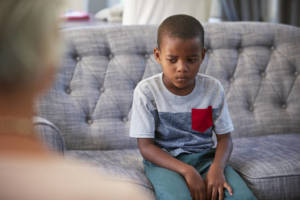 Black pain often goes unaddressed. African Americans are less likely to seek mental health services than other minorities according to the U.S. Department of Health and Human Services Office of Minority Health. Black children are no different. Black kids are exposed to violence at much higher rates than any other rates.
Black pain often goes unaddressed. African Americans are less likely to seek mental health services than other minorities according to the U.S. Department of Health and Human Services Office of Minority Health. Black children are no different. Black kids are exposed to violence at much higher rates than any other rates.
The impact of seeing and normalizing violence is traumatic. Studies say that Black youth are three times more like to be victims of reported child abuse or neglect, five times more likely to be victims of homicide and three times more likely to be victims of child abuse or neglect.
This victimization comes with a lot of traumatic implications for the plight of the Black child. The National Center for Victims of Crime marked that oftentimes victims of crime experience alienating feelings such as denial, anger, shock, numbness, and PTSD.
Kids often don’t have the mental faculty to process such extreme situations. With mental health being a taboo subject in a lot of our communities, the question is “How do our children survive inside of supposed safe-havens such as school?”
We talked with two Black men from Chicago who are dedicated to creating safe spaces for young Black children. Kendall Straughter is the founder of GT7, an organization that is designed to support the social, emotional and academic development in young men of color within the urban communities. Darnell Leatherwood, is the founder of Black Boys Shine, a campaign to highlight the awesomeness of Black boys in all of their glory.
These two brothers aredeeply concerned about addressing the unchecked pain of our Black children, especially our Black boys. Here’s what they had to say.
BlackDoctor: As an educator what do you feel trauma does to the outlook of a child? Specifically affects it effect them in the classroom or school in general.
Leatherwood: The dictionary defines trauma as "a deeply distressing or disturbing experience". As and educator, I believe trauma has the potential to completely derail a student in the classroom...distracting them for their work, handicapping their social emotional development, keeping them from realizing their full potential. However, trauma is not a singular event/experience and all students are not the same.
So a blanket statement about the relation of trauma (there are various traumas one may experience) and the academic outcomes of students is a bit unstable in my opinion. Therefore, I would like to think of this relationship from a research perspective (in addition to my educator perspective) and engage this question empirically. Scientifically, what do we know about the relationship of trauma and student academic outcomes?
Let's take one example for the sake of discourse. In a study conducted by Boyraz and colleagues (2013) on the relation between Post-traumatic stress disorder (PTSD) and college persistence for Black students in their first year of study, the authors found that PTSD levels were positively associated with an increased likelihood of leaving college before the end of the 2nd year of college for women. However, Boyraz and his co-authors (2013) found no such relationship (at least a statistically significant one) for Black males.
There are more examples that we can cite but for the sake of time I will end with this, personally I believe trauma to have the capacity to seriously disturb the potential for academic success forany student. However, some research would suggest, and this is my hypothesis as well, that the relationship between trauma and student academic outcomes varies based on the trauma and who experiences said trauma.
Straughter: In urban education, there are many variables that impact the academic achievement for students. The emotional well-being is a key variables that lends the opportunity for students to strive or survive. Our students come to school daily with unresolved trauma from adverse childhood experiences from their homes, social experience and school experiences.
The negative impact from unresolved trauma and reoccurring trauma effects students ability to cope properly which in terms causes a disruption in learning. Students can’t learn when they are emotionally unhealthy! Students can’t strive when they are stuck in survival mood!
So, it shows in their grades, behavior and attendance which are all three metrics for students to be academically successful.
In additional, the vicarious trauma that impacts the teaching staff in school. When students are unhealthy, the teaching staff feels it too! Now, we have a school community with emotionally unhealthy students and teaching staff. That’s an environment where academic rigor cannot occur. It’s a place where hope fades away.
BlackDoctor: How is your organization addressing the mental health/trauma needs of Black Boys?
Leatherwood: Black Boys Shine is acampaign to illuminate the character and contributions of Black Boys and Men nationally and internationally. It's concerned with controlling and strengthening a positive narrative of Black boy- and manhood. In promoting a positive narrative we have the additional benefit of potentially producing positive identity formation, increasing self esteem, and addressing the mental health/trauma needs of Black boys by providing the kind of capital that may shield them from unproductive outcomes.
Straughter: Gifted and Talented Seven (GT7) Inc. believes that you can nature youth to a healthy place where they can strive. GT7 provides structure where youth can learn to identify to emotions, express their emotions and cope with the various emotions in which they will experience.
During our Summer Male Enrichment Camp, our youth receive therapeutic supports from clinicians twice a week for a full hour. During these sessions, we focus on the 5 social and emotional learning competencies to accept them in being a place with they can strive emotionally.
Our youth feel good, feel safe and feel supported which in terms allows them to positively contribute to GT7 community and other global communities.
BlackDoctor: What can the community (parents , teachers etc) do to support Black Boys ?
Leatherwood: The community has an immense role in supporting the development of every child. Parents, teachers, and other stakeholders are tasked with "preparing and showing the way" for our young people. Let's think about it like this, if our students are on a street to their destiny what was/is my role in constructing, maintaining, and embellishing said street.
Have I laid a street that is easily traversed or have I done nothing and just left gravel and dirt at the feet of the children. Am I putting potholes in this street or am I providing directions that will aid in them getting to their destination. Are you a support or hindrance, make up your mind for our children are to valuable to wait on and deal with capricious adult stakeholders.
Straughter: INTENTIONAL COLLABORATION WITH FIDELITY! We have to work together! We can no longer play the blame game of debating which group isn’t providing the right amount of support for proper development.
The GT7 Triangle of Support outlines, the need for intentional support from the parent (household), the school and the mentor program in effects to drive the development of the the youth. In a perfect world, all three areas have a high level of functioning. However, it’s the real world and unfortunately there are challenges that cause an off balance of support. But, it is importance for all three areas to understand that its a team efforts... its the NBA Championship in we’re in game 7 so you have to give it all that you have because we can’t afford to lose another black male youth!
It’s going to take time, this is a generational problem with strong systemic barriers tied to can’t black, brown and poor male youth disenfranchised and underserved. We have to triage this community health issue! We have to figure out the interventions that work and don’t work. GT7 is committed to changing the narrative for black and brown male youth.
I was told in high school by my mentor, “Kendall, there is a little black boy in the future and he is waiting on you. If you don’t do what is necessary now, you are going to miss you opportunity to help him and he will die. Do you want his blood on your hands?” In high school, I was a blame away! As an educator now for the last 13 years, nonprofit organizer, and social father to my amazing sons, I understand now more than I every have before; they need us!
Daunte Henderson, founder of the MADEMAN Foundation, author, and educator based in Chicago. You can follow him at @brotherhenderson on IG










